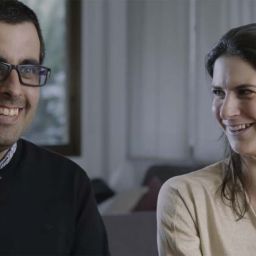What are the most important skills for tomorrow’s leaders, that yesterday’s leaders don’t have?
Only big questions this episode because we have some serious intellectual muscle on the podcast…
Geoffrey Moore is an advisor to the leaders of start-up and established high-tech enterprises. Most recently: Salesforce, Microsoft, and Google. And the author of several best-selling and hugely influential business books. Most notably: Crossing the Chasm.
Professor Sandra Sieber is Professor of Entrepreneurship at IESE Business School, one of the world’s best business schools – ranked No.1 in the world for six years running by the Financial Times.
This is Real leadership podcast: Every episode, a business leader shares human stories and hard truths from their career. And an expert turns those stories into lessons we can all learn.
In this episode, Geoff and Sandra discuss:
- Why is narrative such a powerful leadership tool?
- What is the problem with collaboration?
- How do the leadership styles of Volodymyr Zelensky, Steve Jobs and Elon Musk compare?
- How do companies get stuck?
Listen to this podcast:
Listen & subscribe on:
Spotify Apple podcasts Amazon podcasts
Fore more content like this visit the Real Leadership website.
Podcast transcription:
Adam:
Hello and welcome to This is Real Leadership. Where, every episode, a proven business leader shares human stories and hard truths from across their career. And an expert turns those words into lessons we can all learn.
No buzzwords. Just real people and real talk.
I’m Adam Burns. I have been talking and writing about business leadership – good and bad – for over 25 years and still every day’s a school day. Which is why, in this podcast, I’m also joined by that expert – a distinguished professor from IESE, one of the world’s best business schools – ranked number 1 in the world for six years running.
They’ll also be talking with our guest. And then, just with me. Offering their expert analysis of the conversation as I ask: what are the real leadership lessons here? What can we learn, in the next 30 minutes, that can have a positive impact on us, the people around us, the places we work, the world we live in?
Let’s find out. Welcome Professor Sandra Sieber…
Sandra Sieber:
Hello, Adam.
Adam:
Sandra, you are IESE’s Professor of Entrepreneurship. Randy Zuckerberg once described the entrepreneur’s dilemma as work, sleep, family, fitness, or friends, pick three. Do you agree? Or can we have it all?
Sandra Sieber:
I think that in these times you actually need to pick three to be able to be an entrepreneur and that is a reason why I’m not. I haven’t been able. I need a little bit of all five of them. Sometimes I sort of go a little bit down on work, sometimes I go a little bit down on sleep, sometimes I go a little bit down on fitness, sometimes on friends, never on family I think. But it’s hard and when we try to do all of it I think that we cannot be entrepreneurs. So yes, I think that she’s right.
Adam:
So maybe we can have it all. Just not all the time. Right… This week’s guest. Sandra and I are big fans. Geoffrey Moore is an organisational theorist and advisor to startups and to the leaders of established high-tech enterprises. Most recently: Salesforce, Microsoft, and Google. He is also the author of several best-selling and hugely influential business books. Most notably: Crossing The KAZM, now in its third edition and still the bible for how to sell high-tech products to mainstream customers.
We wanted to know about the most important skills tomorrow’s leaders will need that yesterday’s leaders don’t have. And we start with one small but vital part of the answer.
Until now, most of Geoff’s books have offered singular frameworks to help solve specific challenges – from bringing ideas to market in Crossing the Chasm, to competing with disruption in Zone to Win. But his latest addresses an ethical question for the modern business leader: how should I behave? Why that question; why now?
—
Geoffrey A Moore:
So, you know, yeah, as you say, most of my career has been writing business books about how do you confront the challenges of technology disruption in a capitalist system and how does that work? But the latest book, The Infinite Staircase, really is a philosophy book. It’s about metaphysics and ethics. And basically, the reason I think it was important for me to write, or at least I cared about it was… We have some ethical challenges in our generation and there was a time when you could look back to religion and say, well, religion will ground our ethics and if we just get realigned with religion, all will be well. That narrative is not playing out anywhere near as strongly as it used to in the past. And so in a secular world, where do ethics come from and why? Why should you be good? Where does it all come from?
Sandra Sieber:
Here at IESE what we have is this humanistic approach to management in which we say it’s probably more important to do the right thing than to make most money, right? And I think that we all are starting to see the dangers of focusing on the wrong things, not just for companies, but especially for society, no? So, and we probably have overshoot it in the past years. And yes, we had phenomenal growth, but at what price? So we are back here saying, if you don’t have a mission in your business life, and you don’t want to have a sort of transformative way of looking at society in which you say, I really want to influence society in a good way, it’s going to be hard for the companies to really do the right thing. And here I think that Jeff’s work and our vision and mission that we really have as a business school are very much aligned, right?
Geoffrey A Moore:
The zone to win book, I think it’s trying to confront some of these pressures because look, you have to fund good works. So you better be making money or you can’t fund good works, right? And so how do you balance it together? What the zone model was trying to say is look, there are zones of interest. They’re legitimate. There’s a zone of interest we call the performance zone. Its job is to make money. And if you’re not making money in the performance zone, you’re failing your business. So that’s serious. There’s a zone called the productivity zone, which has a couple of missions, one of which is to support the performance zone and make sure it’s legal and make sure it’s doing, you know, it’s doing all its finances correctly and it’s HR correctly and it’s IT correctly. But it’s also a place where Sandra’s mission, where that, where that more societal mission can often live. So you can say, look, we are going to take a portion of our returns and we are going to use them in a way that’s productive for our community or for whatever we want to be in service to. And that mission should touch… So the performance zone is creating the funding and should be aligned with the mission. The performance zone can actually do a lot of good in the world by itself. I mean your products and services should be good for the world. But then the productivity zone can do some of these more discretionary things. And then the other two zones were more about catching up with the next wave.
—
So… What skills will tomorrow’s leaders need that yesterday’s leaders don’t have? One part of the answer is clearly: more mission. Today your business has to make money and do good. So leaders have to stand for something, whether their role is performance, productivity, incubation or transformation.
The next part of our conversation is about real talk. And in many ways, I think this is the meat of the matter. Geoff believes today’s generation is more collaborative. How will that affect the leadership skillset?
—
Geoffrey A Moore:
My father’s generation was very authoritarian. It was a very hierarchical, bureaucratic vision of business. My generation was much more competitive. It was an egoistic, not egotistical, but egoistical, may the best man, and by the way, it’s probably sexist too, best man win kind of generation. This generation, I think, has a lot more social consciousness and value orientation. The danger with this generation is it becomes too self-absorbed and too caught up in entitlements. And so I think the most important thing that Sandra, you’re doing, that I’m doing is to say, give the corporation, give the people in the corporation something to orient themselves outside of their own selves. And so in my father’s generation, that was your boss. So whatever your boss said, that was authoritarian, very military sort of model. In my generation, it was typically the competitor. It was the technology and the competitor. Can you keep up with the technology? Can you beat the competitor and get to be, we call it the gorilla, those will be called the gorilla game, right? In this one, I think it’s more about can you serve your customer at a higher level? Can you have more of a legacy? Can you have more of an impact on the world? And, but whatever it is, it can’t be about you. Whatever you’re using to orient yourself, it’s gotta be outside of yourself.
Sandra Sieber:
And here, I think that we’re getting into something that… I think for you it’s also sort of the glue that holds the thing together, which is language, right? Because we’re starting to say that what matters is probably the stories that we tell, the narratives that we have, even the analysis that we do and the theories that we convey with our stories. I think it’s becoming more important in this generation than in the previous one that we saw.
Geoffrey A Moore:
Narrative to me is at the core of identity and the core of mission, the core of purpose. So what I think is challenging for this generation is, and by the way, this month or this year, this whole thing about chat GPT, this generative prompt technology, it is clearly an incredible narrative… It is a AI narrative creation machine. And it’s, by the way, for things where you have non-value bearing narratives, like technical support or questions about facts or whatever, it’s fabulous. But in value-based narratives, it can generate a very credible value-based narrative that’s not true. And so I think there’s a lot of anxiety now. And I think this whole generation is going to have to think about, you know, because you hear about conspiracy theories and you hear about, you know, all these. So how do you sort through the narratives to find what, at least for you, are the true narratives and the ones you want to live by? And then being good with narrative, because narratives inspire people. And for me, see the analytics, the spreadsheets, the Excels and then the SAP financial statements, they’re a necessary part of making it work. But they do not inspire. They do not engage and they don’t enlist. But when Steve Jobs said, we wanna think different here. We wanna change the world. We don’t wanna make sugar water. We wanna make computers. That engages and enlists. Like the narratives that come out of the Ukraine right now. I mean, Zelensky, he has an amazing capability to tell narrative. And it’s just leadership, I think that to me, that’s why I care so much about narrative.
Sandra Sieber:
I talk a lot about business model innovation, and then I talk about the methods, methodologies. What do startups do that we should incorporate into the big elephants, into our dinosaurs, so that they can move faster, move better, identify the real problem, move away from their clients, start to see the new ones, and do what we normally say in entrepreneurship. How do we bring that to those companies and… And I think that there’s something that I read from you, is this, I mean, take what they have, the legacy to the next level, right? Because there’s a tremendous value in the experience of these companies, but we have to unleash it so that actually it can survive and can go to the next level. And that is my mission here, is how do I get those guys to open their eyes, to look outside, to go there and do it with humility, yes of course, but also being bold and brave.
Geoffrey A Moore:
And this is where I think Steve Jobs, in particular, is an iconic leader here, which is when you start a transformation, most companies feel like, well, if we win, we win, if we don’t, we don’t. With Jobs, it was like, no, this is like open-heart surgery. If you go into the transformation zone, failure is not an option, and everything else is second. And that, I think, is that, if I had to take one message that I think most corporations and boards of directors do not, to this day, have not internalised, it’s that transformation, is a life threatening but also a life reaffirming initiative and it takes priority over everything else and I don’t think people treat it that way. I think people think that they can, you know, it’s optional and I think it’s dangerous.
Sandra Sieber:
But Jeff, don’t you think that for leadership is tremendously difficult because you’re moving from becoming being a performance sort of innovation leader to you and you have to change right and I in my classes I call this creating organizations designed to change because I don’t think that’s just one transformation because it’s a continuum of transformation. What do you recommend the leaders to do?
Geoffrey A Moore:
So I don’t think it’s fair to ask one human being to be a great leader in four zones. I just, I mean, there might be a human being that can do it in one or two. But, but so I think as a leader, the first thing you have to say is, what is my zone? Which zone am I best at? And I’ve worked with leaders who are good in all four zones. Most leaders who are really good in one zone have a zone where they’re not very good. So for example, take Salesforce. So I would say that Mark is strongest in the transformation zone, then performance zone, or incubation zone. And frankly, productivity zone was not his interest and it was not his weakness. He, by the way, got challenged, Salesforce in the last year got challenged by some activist investors to improve their productivity zone. But what he did, which I have huge respect for, he said, look, I need lieutenants to help me here. And so he brought in a guy named Juan Perez from UPS to do the IT, Amy Weaver’s doing the CFO. I mean, and Brian Millam’s being a COO and you can see, and that’s what I think you have to do. You have to say, look, when it’s in my zone, I should be out front leading. But if it’s another zone, I need to empower my lieutenant or a lieutenant, to be a leader and then I have to support the heck out of them and I can’t like wash my hands of the whole affair. But I have to really focus the corporation saying I know you normally look at me, but for this initiative I want you to look at this person and I’m behind them, supporting them, but this is the person who’s going to lead us through this effort. Which means you have to develop a bench or a leadership team that is better than you. And the tendency, I think the companies that get stuck, I think they hire people like themselves. So if I’m a performance zone leader, I hire more performance zone leaders. And we crush the performance zone, but we miss the other zones.
—
And now we know the ability to weave an engaging, purposeful narrative is a vital skill for tomorrow’s leader. Much more so than the day before yesterday, when being the boss was enough. And yesterday, when everyone just wanted to beat everyone else and that was enough.
Narrative enlists others to your mission. As Sandra said: open your eyes, look outside, be humble, bold and brave.
So, make products that do good things, tell good stories about them, hire good people to do the stuff you can’t, and count on the naturally collaborative nature of the current generation. That’s how to run a great business today and there’s nothing else to be worried about. Right Geoff?
—
Geoffrey A Moore:
There’s a lot of forces that make this just hard. The shareholder pressure, you know, the just competitive, the traditional competitors, the customers, whatever. So I don’t want to make this too easy, but I do think the collaboration, and by the way, the collaboration cultures are collaborative in the performance zone. They’re good team players and they play well as a team as opposed to in my generation frankly, one division manager at IBM or Microsoft or Cisco was as competitive against their peers they were against an outside competitor. I mean these people were really, this was a very egoistical sort of framework for that generation. By the way, they accomplished miracles. The internet, please, it’s pretty good. Global commerce, ERP, I mean, it was an amazing time. Client server computing, I mean, it was huge. But it was done through, I think, a very blinkered way. So I think the collaborative thing, and you look at like what Satya Nadella and the impact he’s had at Microsoft as an example, it’s a different company, and I think it’s a better fit for todays era, you know, just like maybe Bill and Steve’s Microsoft was a great fit for that era. I think Satya’s Microsoft is a great fit for this era. And if you look at the leadership style changes, I think it’s a lot of what Sandra is talking about in terms of the humanistic, humane, which is not a word that you would have associated with any of the winners of the 90s. Nobody said that Sun, Cisco, Intel, Microsoft were humane. They said they were amazing, but not so humane. people are doing that. My anxiety is that we’re losing… One of the things about collaborative cultures I like is they’re more empathetic, but one of the things I don’t like is that they struggle with accountability, and they particularly struggle with holding other people accountable to their commitments. And we’re seeing that in our society right now, we’re seeing it in our cities, and we’re seeing this inability to create an accountability culture. It’s a dangerous thing. I don’t know, Sandra, do you guys talk about this accountability at all in your curriculum? Because I think it’s an important issue.
Sandra Sieber:
We actually do because it’s something that… When you do everything collectively, you can dilute yourself very easily. So I think that one has to be tough on the youngsters and also sort of bring them back and say, hey, there’s certain measures here that are just for you. And then of course, it’s for the collective. It’s fine. We collaborate. But then at the end, there are certain things where you have to also for you good, stand up and say, this was my work. It’s like, hello. You can learn something from us. We were probably more the individualistic guys, but sometimes this is also good, and so that they see that it’s not just all like sort of happy collaboration, but that sometimes it’s also, I mean, in order to move forward, I mean, you need to get accountable for yourself, for what you’re doing. You need to know what actually was your contribution rather than dilute yourself. I just wanted to add one thing for the leaders. You’re saying they’re based in zones. One thing that I am finding more and more, and I’m now looking forward to do some research. And I actually… And we see this in soccer, is that certain leaders are able to just sort of put the head up and watch what’s going on. No. So, yes, you’re in your zone, but I am the linking pin. No, I’m the one that watches and watches and watches. And I think that this is a quality that we will also have to study even more with our leaders. Because yes, okay, you’re in this zone, you’re in this zone, but then you also have this quality of just sensing what is going on. And this is not just watching up, it’s watching down, because we have all the people in our organisations, but it’s just this ability to grasp what is going on. For me, it’s one of these super qualities for the future, for the leaders of today, for the future, that I think that we still haven’t studied fully, and that I would actually, I’m trying to find studies in which we say, OK, what is going on here? No, who are these super leaders that really get the grasp for the different dimensions of complexity?
Geoffrey A Moore:
Yeah. I couldn’t agree with you. I really do think that when you say leader, by the way, in Silicon Valley, I have to say about leaders versus managers. Most companies, and particularly my father’s generation, my generation, advocated for manager. Then a leader was something special, but managers was all about. In the last generation, it shifted and now everybody wants to be a leader. And frankly, nobody wants to be a manager. The truth of the matter is you need both, right? The manager is the person who’s more local, more on top of the day-to-day kinds of stuff, which if you don’t pay attention to. But this leader thing, what you’re talking about, I think is a leader has this ability to pop their head up and do the 360 and sort of get to what is going on and then reorient the team in a time of change. And if I go back to my high horse about narrative, I think… The leader uses a new narrative as a way of doing that reorientation. But to your point, until you’ve been reoriented, the narrative’s premature, right? You need to see what’s going on before you tell the story about where to go next. I think that’s a big deal.
Adam:
Is it easier or harder, do you think, to be a leader today? Clearly, there’s, we know more. There are more business schools, there’s more research done. There are more frameworks, there’s more books being written. Does that make it easier or harder, Sandra?
Sandra Sieber:
I think it makes you more human, actually. I think leaders today are allowed to be more human than leaders before. I mean, where we were just sort of hunting for the dollar, and it’s like a casual expression. No, I think that now we can hunt for a bigger purpose, the leaders that we have. And I think that’s a terrific situation, right? I mean, it was harder before to do that, but when you start being that type of leader, it’s harder to be a leader. So I mean, yes. I think it’s a good signal and I’m an optimist as you can see. Some people would say everything is getting worse. I actually think we see good signs currently happening in leadership.
Geoffrey A Moore:
Look, leader means you’re going to step away from the norm. And we’re socially engineered to say, look, staying close to the norm is sort of like, that’s sort of like this, not the rule of life, but it’s sort of the reason why, there’s a reason why it is a norm. And so therefore, and then stepping away. And then when you have people who you care about questioning you at that point. Because they do, because they’re going, what the hell are you doing? And I think being able to say, be humble. So one of the defences against that criticism is to be arrogant and just say, I don’t care what you think, I’m right. And by the way, there’s some entrepreneurs, Sandra’s been an entrepreneur. And by the way, some very great, Elon Musk might be an example of somebody of that type. But the point is, but I think for most of us, it’s – stepping away because the mission requires a different approach. And if you’re in service to something that is worthy, then at that point I think you can get your psychological sort of reassurance from that.
Adam:
Geoff, thank you very much indeed.
Geoffrey A Moore:
My pleasure. Great to talk with you both.
—
Adam:
So, Sandra, time for your analysis. Geoff talked about ethics, narrative, why transformation is like open-heart surgery, and why you must develop a leadership team that is better than you. We promised real business lessons. What did you learn?
Sandra Sieber:
Geoffrey is a firm believer that frameworks make a difference. And this is what then really is at the basis of everything and in our talk here we try to relate it back to what it is for people, for communication and for leadership.
Adam:
And what do you think of his, he’s a storyteller, but he was very firm, I thought, on the point that narrative is everything. When you want to change direction in the company, when you want to win people to your plan, to your vision, narrative is all.
Sandra Sieber:
He’s a firm believer in language, right? And then with language comes narratives, comes analytics, comes the theories. So of course, in today’s world, narratives have become more important. Why? Because as he was saying, we’re moving away from very individualistic and hierarchic leadership styles to these more collective and collaborative styles. And when you do that, you need to get a message out. And that’s when the narrative becomes so much more important because you need people to really engage, to buy in, and then we can collaboratively work together with this narrative. But always, I think, sustained by understanding what we’re doing and by having a certain framework. I think that he’s a firm believer of now narratives, but also very much of frameworks.
Adam:
Sandra, thank you very much indeed.
Thank you Professor Sandra Sieber, Professor of Entrepreneurship at IESE Business School. And thank you for listening. Please do subscribe, share and let us know what you think of our podcast. Is narrative the key skill, or just one of them, along with the vision of a world-class football player and a framework that lets everyone play in their best position? Do you think differently to Geoff and Sandra? Let us know in the comments or email us. All details are in the podcast description. But for now, goodbye.
Real people, real talk and real business lessons you can use. This Is Real Leadership.

















